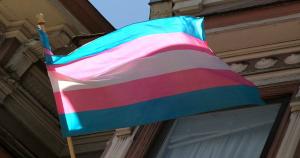
A boisterous, upbeat crowd of LGBTQ advocates and Democratic leaders launched their campaign Wednesday to add sexual orientation and gender identity protections to federal nondiscrimination laws.
In an atmosphere akin to a pep rally before the big game, supporters of the Equality Act from the House and Senate said the country is a patchwork of conflicting state laws where gay or transgender residents are either protected or legally discriminated against.
“In most states in this country, a gay couple can be married on Saturday, post their wedding photos on Instagram on Sunday and lose their jobs or get kicked out of their apartment on Monday, just because of who they are. This is wrong,” said the bill’s sponsor Rep. David Cicilline, D-R.I. “And we are introducing the Equality Act to fix this.”
Cicilline and others argue the bill benefits more than gay and transgender Americans. But some religious freedom advocates say it supports the LGBTQ community at the expense of religious objectors to same-sex marriage.
“The Equality Act fails to provide essential religious liberty protections that would allow a diverse group of social service and civic institutions to continue to thrive,” said Shapri LoMaglio, senior vice president for government and external relations for the Council for Christian Colleges and Universities, in an email.
In addition to creating new protections for gay and transgender Americans, the act would limit the scope of federal religious freedom protections, preventing religious people and organizations from using the Religious Freedom Restoration Act as a defense against discrimination claims.
If it passes, religiously affiliated schools and other faith-based organizations could face lawsuits over policies on gay, lesbian or transgender students, customers or employees, said Tim Schultz, president of 1st Amendment Partnership, a Washington, D.C.-based organization that promotes religious freedom protections.
“There would be an effort to punitively sue them into oblivion and they would not be able to use (the Religious Freedom Restoration Act) in their defense,” he said.
“Claiming a religious right to discriminate is the antithesis of genuine faith commitments and moral teaching,” said Rabbi Jack Moline, president of Interfaith Alliance, on a Wednesday press call.
Moving forward, lawmakers and other stakeholders need to seek balance, not treat the clash between religious and LGBTQ rights as a winner-take-all affair, Schultz said.
“Do we want these issues to cause ongoing conflict and legal battles or do we want a solution?” he said.
The Equality Act would add sexual orientation and gender identity to the list of other characteristics protected under federal laws against discrimination in housing, employment and access to credit. Additionally, it would amend the Civil Rights Act of 1964 to prohibit discrimination in public spaces and services and federally funded programs on the basis of sex.
Like similar state-level nondiscrimination laws, it aims to ensure that gay or transgender people are treated the same as others in their job search or while visiting a local store. Twenty-one states, including Utah, already prohibit sexual orientation or gender identity-based discrimination in housing and hiring, according to the Human Rights Campaign.
What stands out about this legislation is that it also seeks to weaken the Religious Freedom Restoration Act, a federal law aimed at ensuring that the government won’t substantially burden someone’s religious exercise unless it has a compelling interest to do so and can’t find a less restrictive way to protect that interest. If the Equality Act passes, religiously affiliated schools, businesses, nonprofits and others would have a harder time defending themselves in court, Schultz said.
The bill’s supporters say it will be good to clarify the scope of the Religious Freedom Restoration Act. Too often, religious freedom is used as a shield against discrimination claims, said Sharon McGowan, chief strategy officer and legal director for Lambda Legal.
“The Equality Act makes it clear that the Religious Freedom Restoration Act is not something that can be used to create a gaping hole in these federal protections” against discrimination, she said.
People of faith should celebrate a world in which members of the LGBTQ community won’t live in fear of discrimination, said the Rev. Jennifer Butler, CEO of Faith in Public Life, during the Wednesday press call.
“The Equality Act will clarify that the Religious Freedom Restoration Act cannot be misused to allow entities to discriminate and violate civil rights laws,” she said.
This clarification could lead to significant consequences for religious objectors to same-sex marriage, according to opponents of the Equality Act. For example, faith-based schools, which have always been part of America’s diverse higher education system, might have to sacrifice their religious convictions in order to be eligible for federal aid money.
“It is essential that any protections for LGBTQ persons be paired with the essential religious freedoms that maximize freedom for all,” LoMaglio said.
Cicilline warned supporters that conservative opposition will use religious freedom as a defense against the bill.
“They’ll make outrageous claims because they know they can only succeed by scaring the American people,” he said. “We cannot allow people to use religious freedom as a basis to discriminate against an LGBT individual.”
The Equality Act’s supporters, including people of faith, argue that a large majority of Americans support civil rights protections for members of the LGBTQ community. They describe the bill as a common sense measure that’s been needed for years.
“I’ve seen firsthand the need for this in states” across the country, the Rev. Butler said.
A new analysis from Public Religion Research Institute appears to support these claims about the bill’s popularity. It found widespread support for the nondiscrimination protections offered in the Equality Act.
“Nearly 7 in 10 (69 percent) Americans favor laws that would protect (LGBTQ) people from discrimination in the job market, public accommodations and housing,” according to the analysis. This support holds “across virtually all demographic groups and geographical locations.”
Around 8 in 10 Democrats (79 percent) and 56 percent of Republicans favor LGBTQ nondiscrimination laws, the institute reported. The same is true for majorities of all major religious groups, including white mainline Protestants (71 percent), white evangelical Protestants (54 percent) and members of The Church of Jesus Christ of Latter-day Saints (70 percent.)
However, around half of U.S. adults (46 percent) also support owners of wedding-related businesses who, for religious reasons, don’t want to serve same-sex couples, according to an earlier Public Religion Research Institute report. If the Equality Act passes, these business owners would be required to serve gay couples.
“I don’t think this bill reflects the both/and consensus of the majority of Americans,” Schultz said. He believes most people would prefer legislation that protects members of the LGBTQ community and religious objectors to same-sex marriage at the same time.
“This is a real missed opportunity,” he said. “There is a better way forward that would appeal to a much broader swatch of Americans and, therefore, their elected officials.”
Cicilline has introduced the Equality Act twice before, but he and sponsor Sen. Jeff Merkley, D-Ore., predict this year will be different. Not only do they have 239 co-sponsors in the House and 47 in the Senate, but House Speaker Nancy Pelosi, D-Calif., has made passage of the bill a top priority in the Democratically controlled chamber.
“So here we are today … proud to stand with members from both sides of the Capitol to take a momentous step toward full equality for LGBTQ Americans and for our country,” Pelosi said.
She and Cicilline mentioned the Defense Department’s new rules, unveiled this week, barring transgender troops and military recruits from transitioning to another sex to underscore the need for the measure.
In its current form, the Equality Act is unlikely to receive broad, bipartisan support. One House Republican, Rep. Brian Fitzpatrick of Pennsylvania, and one GOP Senate member, Sen. Susan Collins, are backing the measure, but its prospects in the Republican-controlled Senate look dim.
“I continue to have concerns that the Equality Act has serious flaws — namely its failure to protect religious liberty,” said Sen. Mike Lee, R-Utah.
Following the news conference, Cicilline explained the bill would give to the LGBTQ community the same protections and exemptions given to other protected classes and not take anything away from religious groups.
“I don’t think faith groups have any reason to be afraid of this bill,” he said. “The Civil Rights Act does some very careful balancing between two important values, freedom of religion and freedom from discrimination, and we think it strikes the right balance and the Equality Act will continue that.”
Schultz and other religious freedom advocates disagree. The Civil Rights Act passed because lawmakers worked hard to balance competing concerns. The Equality Act, on the other hand, is only concerned with the needs of the LGBTQ community, they said.
“It’s really unlikely to imagine a bill that is one-sided will ever achieve that kind of broad, bipartisan buy-in,” Schultz said.
Predictions like Schultz’s won’t stop the bill’s religious supporters from mobilizing on its behalf. The Rev. Butler and others are calling for faith leaders to sign a letter in support of the Equality Act and call on Congress to pass it quickly.
“We believe equality is a right. Our nation’s laws must uphold our values of loving and caring for our LGBTQ neighbors as ourselves,” the letter reads.













